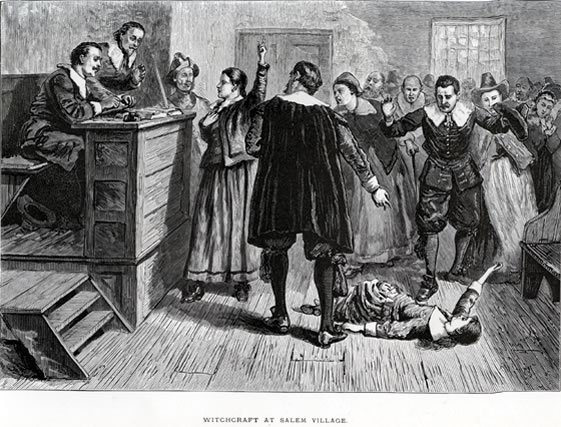|
|
LITR 4231
Early American Literature lecture notes |
|
5th meeting: Salem Witch Trials
| assignments review > midterm Shae on Mather Jeff film on Crucible (2 parts?) Discussion of Crucible |
|
Tuesday, 16 February: Salem Witch Trials and The Crucible (3rd generation of Puritans)
Readings:
Cotton Mather, The Wonders of the Invisible World
Arthur Miller, scenes from The Crucible
Student Presentations
Discussion Leader: Shae Turner (Wonders)
Questions: Why do people remember the Salem Witch Trials and nothing else about the Puritans?
film highlights: The Crucible
student presenter: Jeff Derrickson
Discussion Questions for Miller: 1950s context for The Crucible: McCarthy “witch-hunt” for suspected communists, an event for which The Crucible is partly an allegory.
Why
is that conflict allegorized as the
Puritan witch trials of
What attitudes regarding government + religion? Attractions / repulsions of government + religion?
What other panics resemble the
Why might an audience enjoy the play even without historical context? What elements of tragedy or the gothic? Portraits of women? (often at center of Tragedy)
Discussion Questions for Mather: What relationship between historical events and Miller's play? “Intertextualty” b/w Mather and Miller?
Compare Bradford and Hawthorne on the Maypole of Merry-Mount. Note appearance of
review > midterm
last week's class, 2 truths about course
2nd half of class: Robbyn's discussion of poem by Berkeley & Allison on Rowlandson's Captivity Narrative worked
lyric poems can reach across time--compare Bradstreet
a good story like Rowlandson's captivity narrative can reach across time
facts and data don't reach across time!
My opening background on Puritans wasn't bad, but wore everyone out
Conclusion: true enough, just like all history, but so what?
With more time and energy > Puritan generations, utopia
Problem with deep history:
Knowledge is needed, but except for experts, background quickly becomes unnecessarily complicated
Learners need broad but fair themes
But which do you start with?
Do you start with texts, facts? Or emphasize meanings?


